There’s storytelling, and then there are very telling stories. Like the one about the Syrian refugee who was stuck in a Malaysian airport for seven months before being rescued by a group of Canadians, and the one about the woman who, after years of feeling like an outsider, became Cornwall’s first female mayor and woman of colour.
One of our finest Canadians, former governor general David Johnston, shared his stories, wisdom and insight with a crowd of about 150 people Tuesday at The Kindness of Strangers fundraiser for Refugee 613, along with global brand strategist Thomas Coombes, Cornwall Mayor Bernadette Clement, Hassan Al Kontar (a.k.a. “the man in the airport”) and Ketty Nivyabandi, a human rights defender who was forced to flee her home in Burundi in May 2015 after leading a peaceful protest by women. The benefit was held at allsaints Event Space in Sandy Hill.
Nivyabandi moved into her first apartment in Ottawa in 2017, after having spent 10 months in a homeless shelter. She spoke of the exceptional kindness shown toward her by a group of strangers, and of how their kind-hearted ways transformed her life and “erased all boundaries”.
OBJ360 (Sponsored)

What’s happening in Ottawa in 2024? Ottawa Tourism has your activity line-up covered
2024 promises to be another fun-filled year for Ottawans and visitors alike!

uOttawa’s Kanata North campus marks 5 years in Canada’s largest tech park
Whether companies are looking to expand R&D activities, grow their teams, or capitalize on funding opportunities, uOttawa has been there to help.
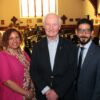
The evening was hosted by Ottawa author and broadcaster Mark Sutcliffe, who also served as honorary chair and one of the sponsors, through his business training and coaching firm, Sutcliffe + Whalen.
“Helping others isn’t just an obligation — it’s an opportunity,” Sutcliffe noted in his opening remarks. “We get something out of it, too. It feels good. It’s satisfying. It’s rewarding. It’s fulfilling. It gives us a sense of purpose.”
The evening had raised close to $10,000 when Sutcliffe announced that he would personally kick in another $1,000. He hoped that others would pitch in, as well. Johnston donated $1,000 and, by the end of the night, Refugee 613 co-founder and director Louisa Taylor announced the total to be just shy of $14,000.
Volunteer organizers included Martha Jeacle, office coordinator at Mann Lawyers. It was one of two Ottawa law firm sponsors. The other was Perley-Robertson, Hill & McDougall.
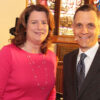
Taylor, a former newspaper editor and journalist, spoke briefly about the “incredible acts of kindness” that she’s witnessed from volunteers, sponsors and community agencies over the past several years. They’ve been rolling out the welcome mat for individuals who never expected to come to Canada.
“They’re not here by choice and they’ve overcome incredible challenges to be here and to thrive,” said Taylor. “It has been an amazing experience to see the love, the passion, the care, the positivity, the goodness — the honest to God goodness — of people, day in and day out.”


During his speech, Al Kontar challenged his audience to think of a time when they’ve been stuck at an airport due to a flight delay or cancellation. “It doesn’t matter how long you waited, I’m sure I beat your record,” he said light-heartedly of the 6,500 hours he spent in limbo in Malaysia’s Kuala Lumpur Airport. Syrian authorities wouldn’t renew the man’s expired passport because he did not serve in the army, as required.
Luckily, Al Kontar had his cell phone. He took to social media to share his story and, in return, received offers of support from around the world.
“My life has been changed, my future has been changed because of one individual I never met who reached out and offered to help,” he said of Whistler resident Laurie Cooper, who was in the audience that night.
She was part of a group of Canadians who learned of Al Kontar’s situation and decided to help. The group applied to privately sponsor Al Kontar and bring him to Canada.
“People, normally, when they describe hope, they say that it’s the light at the end of the dark tunnel,” said Al Kontar. “For me, it’s in each and every individual who reached out to me, who encouraged me, who supported me in any way they can. That’s hope.”
Hope is also what continues to motivate millions of refugees who need a reason to keep living, he added. “For you, Canada is your home, it’s your country. For us, Canada is much more than that. It’s a feeling of being permanently safe, with dignity and rights.”
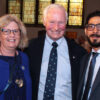
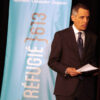
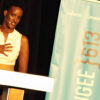
When Clement’s father — who is from the Caribbean islands of Trinidad and Tobago — married her Franco-Manitoban mother back in 1964, her maternal grandparents did not approve of the mixed marriage and skipped the wedding.
During her speech, the Cornwall mayor shared examples of how she always felt different growing up in Montreal, like she didn’t quite belong. She was the only black woman in her law classes at the University of Ottawa. This motivated her to work harder to prove herself, the room heard.
She recalled a male classmate’s reaction to her winning a scholarship that he was passed over for. “He came and told me I must have been accepted to fulfill a diversity requirement,” she said. “I remember very clearly how I felt when he said that to me. That sense of belonging that I had been striving for was fleeting, shaken by that comment.
“That’s why running for office — in that context — was a really big deal.”
Clement, who is francophone, was elected mayor in 2018, following 12 years on council. She received nearly 54 percent of the vote — more than all of her opponents combined.
“Truth be told, I feel a lot of pressure to be an outstanding mayor — the best mayor ever. I worry about doing something wrong or not doing enough, and that that will somehow be held against the next black female candidate. It’s a lot of responsibility, whether I want it or not, but it’s worth it.”

Johnston, who is a terrific storyteller, spoke about “the ripple effect” that small acts of kindness can have on a society, comparing it to one drop of dye added to a glass of water, thereby changing the nature of the water as the dye interacts with the H2O molecules.
“That’s what happens with these individual acts of kindness,” said Johnston, author of Trust: Twenty Ways to Build A Better Country. “Not only do they impact on those who receive that act of kindness … but they ripple across and change the culture.
“It’s so important to hear stories, like the ones this evening, to reach those inner fundamental values that are very much in Canada, from day to day, but sometimes need to be expressed and amplified and extended, like the drop of water.”
Canada’s reputation as a caring nation is under threat, he said, adding that the erosion of trust in public institutions isn’t helping matters.
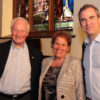
Johnston briefly mentioned that he’s working on a book about empathy. “The word ‘empathy’ essentially means walking in another person’s shoes. It’s not sufficient to be empathetic. You must also be compassionate. Empathy is more of a description of a feeling, whereas compassion is usually something that causes you to act.
“As all of our speakers I think have reminded us, empathetic feelings are really important but you have to move from that to acting on that, to do that one drop of water, that one stone in the pond, to have that ripple effect.”
He drew a similar parallel between the concepts of diversity and inclusivity. “It’s about moving from optics to outcome.”
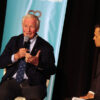
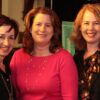
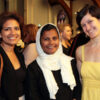


— caroline@obj.ca





